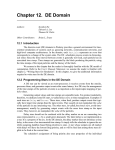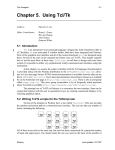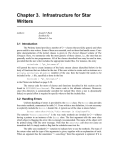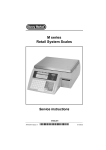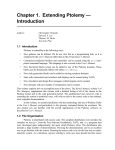Download Block - TU Ilmenau
Transcript
Ptolemy Ptutorial
Edward A. Lee
UC Berkeley
This tutorial is aimed at
the software developer
planning to use Ptolemy
as a platform.
For Ptolemy version 0.7.
Copyright © 9/24/97,
The Regents of the University of California
All rights reserved.
ptuto r ia l _ 9 7 . f m
© 9/24/97, p. 1 of 79
U N I VERS ITY OF CALIF ORNIA AT BERKEL E Y
Ptolemy as a Tool and as a Laboratory
Ptolemy is
• Extensible
• Publicly available
• An open architecture
• Object-oriented
Allows for experiments with:
• Models of computation
• Domain-specific tools
• Design methodology
• Software synthesis
• Hardware synthesis
• Cosimulation
• Codesign
Rationale for heterogeneity: specialized models are
• More useful to the system-level designer
• More amenable to hardware and software synthesis.
ptuto r ia l _ 9 7 . f m
© 9/24/97, p. 2 of 79
U N I VERS ITY OF CALIF ORNIA AT BERKEL E Y
Documentation
The Almagest
Volume 1
User’s Manual
pigi
ptcl
domains
vem
pxgraph
installation
ptuto r ia l _ 9 7 . f m
Volume 2
Programmer’s Manual
software organization
writing stars
infrastructure
data types
Tcl/Tk
domains
code generation
Volume 3
Kernel Manual
documentation
of C++ classes
Essential for
defining
Targets and
Domains.
© 9/24/97, p. 3 of 79
U N I VERS ITY OF CALIF ORNIA AT BERKEL E Y
The Kernel: A Flexible Abstract Syntax
Hierarchical Graphs —
Levels can use
different models of
ptuto r ia l _ 9 7 . f m
© 9/24/97, p. 4 of 79
U N I VERS ITY OF CALIF ORNIA AT BERKEL E Y
Ptolemy C++ Base Classes Support this Abstract Syntax
Block
• initialize()
• run()
• wrapup()
PortHole
Block
PortHole
PortHole
ptuto r ia l _ 9 7 . f m
Geodesic
PortHole
Plasma
Block
PortHole
Particle
• initialize()
Particle
• receiveData()
• type()
• sendData()
• print()
• type()
• initialize()
© 9/24/97, p. 5 of 79
U N I VERS ITY OF CALIF ORNIA AT BERKEL E Y
Object-Oriented Programming
• inheritance
• data abstraction
• polymorphism
The idea is to use a heterogenous software
environment to develop heterogeneous designs. The
interaction between different modules in the software
environment is managed through object-oriented
principles.
ptuto r ia l _ 9 7 . f m
© 9/24/97, p. 6 of 79
U N I VERS ITY OF CALIF ORNIA AT BERKEL E Y
Some Kernel Classes (Booch Notation)
Abstract base class:
Cannot be instantiated.
A
NamedObj
A
GenericPort
Block
Star
Galaxy
C++ class:
• Members & Methods
• Public, Protected, Private
ptuto r ia l _ 9 7 . f m
PortHole
MultiPortHole
Inheritance: A derived class has all the
properties of the parent, plus more.
Data abstraction: Hiding the irrelevant and
amplifying the essential.
Polymorphism: Objects with identical
interface have different implementations.
© 9/24/97, p. 7 of 79
U N I VERS ITY OF CALIF ORNIA AT BERKEL E Y
Example: NamedObject
class NamedObj {
public:
NamedObj ();
NamedObj (const char* n,Block* p,const char* d);
const char* name() const;
const char* descriptor() const;
Block* parent() const;
void setParent (Block* my_parent);
void setName (const char* my_name);
virtual const char* className() const;
virtual int isA(const char* cname) const;
virtual void initialize() = 0;
private:
const char* nm;
Block* prnt;
const char* myDescriptor;
}
ptuto r ia l _ 9 7 . f m
© 9/24/97, p. 8 of 79
U N I VERS ITY OF CALIF ORNIA AT BERKEL E Y
Example: NamedObject
class NamedObj {
Two possible constructors
public:
NamedObj ();
NamedObj (const char* n,Block* p,const char* d);
const char* name() const;
const char* descriptor() const;
Block* parent() const;
Methods to access private members
void setParent (Block* my_parent);
void setName (const char* my_name);
Methods to set private members
virtual const char* className() const;
virtual int isA(const char* cname) const;
Methods to get class information
virtual void initialize() = 0;
private:
const char* nm;
Private members
Block* prnt;
const char* myDescriptor;
}
ptuto r ia l _ 9 7 . f m
© 9/24/97, p. 9 of 79
U N I VERS ITY OF CALIF ORNIA AT BERKEL E Y
Example: NamedObject
class NamedObj {
public:
NamedObj ();
NamedObj (const char* n,Block* p,const char* d);
The return value cannot be modified.
The string will not be modified
const char* name() const;
const char* descriptor() const;
Block* parent() const;
void setParent (Block* my_parent);
void setName (const char* my_name);
virtual const char* className() const;
virtual int isA(const char* cname) const;
Calling a virtual method gives the version in the derived class
virtual void initialize() = 0;
private:
Pure virtual method
const char* nm;
Block* prnt;
const char* myDescriptor;
}
ptuto r ia l _ 9 7 . f m
© 9/24/97, p. 10 of 79
U N I VERS ITY OF CALIF ORNIA AT BERKEL E Y
Hierarchical Abstraction
Examples of Derived Classes
•
class Star:: Block
•
class XXXStar:: Star
•
class Galaxy:: Block
•
class Universe:: Galaxy, Runnable
Universe
XXXStar
Galaxy
XXXStar
XXXStar
XXXStar
XXXStar
Galaxy
ptuto r ia l _ 9 7 . f m
XXXStar
© 9/24/97, p. 11 of 79
U N I VERS ITY OF CALIF ORNIA AT BERKEL E Y
Domain Classes Derived from Kernel Classes
A
NamedObj
Assume “XXX” and “YYY”
are two domain names.
Runnable
Block
Galaxy
Star
A
Wormhole
multiple
inheritance
ptuto r ia l _ 9 7 . f m
Universe
XXXWormhole
XXXStar
YYYStar
XXXUserStar
real work
done here
© 9/24/97, p. 12 of 79
U N I VERS ITY OF CALIF ORNIA AT BERKEL E Y
Domains in Ptolemy
CGC
SDF
BDF
Code generation domains
CG56
CG96
DDF PN
process networks
dynamic dataflow
Boolean dataflow
synchronous dataflow
MDSDF
Silage
PTOLEMY
KERNEL
multidimensional SDF
VHDLF
Thor
circuit simulation
VHDLB
DE
Sproc
CG
ptuto r ia l _ 9 7 . f m
discrete-event
communicating processes
design methodology management
DMM
CP
© 9/24/97, p. 13 of 79
U N I VERS ITY OF CALIF ORNIA AT BERKEL E Y
Ptolemy is an Extensible Open Architecture
Extensions that are possible:
• applications (block diagrams)
• a library of galaxies
• application builders (using ptcl or pitcl)
• a library of custom stars
• customized user interfaces (using Tcl/Tk)
• simulation managers (Targets)
• domains (new models of computation)
• foreign simulators and/or synthesis tools
ptuto r ia l _ 9 7 . f m
© 9/24/97, p. 14 of 79
U N I VERS ITY OF CALIF ORNIA AT BERKEL E Y
Data Types in Ptolemy
A
Particle
MatrixParticle
ComplexParticle
IntParticle
etc.
FloatMatrixParticle
FloatParticle
FixParticle
Actually a double!
MessageParticle
Base class for user-defined data types
ptuto r ia l _ 9 7 . f m
© 9/24/97, p. 15 of 79
U N I VERS ITY OF CALIF ORNIA AT BERKEL E Y
Color Hints at Data Types
blue = float (double)
white = complex
magenta = fixed point
orange = integer
thicker stems indicate matrices
ptuto r ia l _ 9 7 . f m
© 9/24/97, p. 16 of 79
U N I VERS ITY OF CALIF ORNIA AT BERKEL E Y
Anytype
Fork:
replicate a particle
Commutator:
merge particle streams
Distributor:
split particle streams
Red stems indicate stars that operate on any particle. The
code inside refers only to type “Particle,” so these stars are
polymorphic.
ptuto r ia l _ 9 7 . f m
© 9/24/97, p. 17 of 79
U N I VERS ITY OF CALIF ORNIA AT BERKEL E Y
Key Particle methods
class Particle {
public:
virtual operator int ();
virtual operator float ();
virtual operator double ();
... etc...
casts to standard types
convert particles to data
and also change types.
virtual StringList print ();
virtual Particle& initialize();
generate ASCII
reset to “zero”
// Load the Particle with data
virtual void operator << (int);
virtual void operator << (double);
... etc...
// Copy a Particle
virtual Particle* clone();
// compare two particles
virtual int operator == (const Particle&);
ptuto r ia l _ 9 7 . f m
© 9/24/97, p. 18 of 79
U N I VERS ITY OF CALIF ORNIA AT BERKEL E Y
Synchronous Dataflow
Properties
1
• Flow of control is predictable
at compile time
1
1
ENABLED
FIRED
• Schedule can be constructed
once and repeatedly executed
• Suitable for synchronous
multirate signal processing
1
2
DOWNSAMPLE
DOWNSAMPLE
1
ENABLED
ptuto r ia l _ 9 7 . f m
UPSAMPLE
UPSAMPLE
2
FIRED
ENABLED
FIRED
© 9/24/97, p. 19 of 79
U N I VERS ITY OF CALIF ORNIA AT BERKEL E Y
Writing Custom Stars
The quick start:
• Find a star in the source tree.
• Copy it and modify it.
cd my_directory
cp $PTOLEMY/src/domains/sdf/stars/SDFSin.pl SDFMine.pl
chmod +w SDFMine.pl
• Change the name of the star!
• Replace the appropriate fields with your C++ code.
If your star is a modification of an existing star, consider
deriving from the existing star.
ptuto r ia l _ 9 7 . f m
© 9/24/97, p. 20 of 79
U N I VERS ITY OF CALIF ORNIA AT BERKEL E Y
Using Custom Stars
• Make-star (*)
• If $PTOLEMY != /users/ptolemy, you have to set four (!) environment
variables, or the compiler will not work. This is a flaw with the gnu
compilers. See the programmer’s manual.
• Make a test application
ptuto r ia l _ 9 7 . f m
© 9/24/97, p. 21 of 79
U N I VERS ITY OF CALIF ORNIA AT BERKEL E Y
Minimal Star Definition File
defstar {
name { SimpleLog }
domain {SDF}
desc { This star computes the Log of the input }
input {
name{input}
type{float}
}
output {
name{output}
type{float}
}
C++ code
ccinclude { <math.h> }
go {
output%0 << log (double(input%0));
}
}
This should go in a file called “SDFSimpleLog.pl”.
A preprocessor (ptlang) translates it into a C++ class.
ptuto r ia l _ 9 7 . f m
© 9/24/97, p. 22 of 79
U N I VERS ITY OF CALIF ORNIA AT BERKEL E Y
Input and Output for Stars
go {
output%0 << log (double(input%0));
}
Returns a reference to a Particle
Extracts a double from the Particle
Loads a double into the Particle referenced
Manipulating Particles Directly (for Anytype)
go {
Particle& current = input%0;
outputA%0 = current;
outputB%0 = current;
}
object PortHole has operator % defined to return a Particle&
ptuto r ia l _ 9 7 . f m
© 9/24/97, p. 23 of 79
U N I VERS ITY OF CALIF ORNIA AT BERKEL E Y
More Sophisticated Go Method
For most compilers, this explicit
cast is not strictly necessary.
Still it is safest to use it.
go {
double t = double(input%0);
if (t <= 0) {
Error::abortRun (*this, “: log of x, x <= 0”);
output%0 << -100.0;
}
tells the error handler
else output%0 << log(t);
where the error occurred
}
One of many infrastructure classes provided to star writers.
ptuto r ia l _ 9 7 . f m
© 9/24/97, p. 24 of 79
U N I VERS ITY OF CALIF ORNIA AT BERKEL E Y
Accessing Past Samples
go {
double sum = 0.0;
for (int i = 0; i < 10; i++) {
sum += double(input%i);
}
output%0 << sum;
}
accessing past samples
need to declare that this will be done:
setup {
input.setSDFParams(1,9);
}
second argument tells the domain what the largest
argument to the % operator will be. This allows buffers
to be allocated statically and old Particles to be reclaimed.
ptuto r ia l _ 9 7 . f m
© 9/24/97, p. 25 of 79
U N I VERS ITY OF CALIF ORNIA AT BERKEL E Y
Consuming Multiple Samples
go {
double sum = 0.0;
for (int i = 0; i < 10; i++) {
sum += double(input%i);
}
output%0 << sum;
}
the go method is completely unchanged, but:
setup {
input.setSDFParams(10,9);
}
the first argument tells the domain how many tokens to
discard after the star fires.
ptuto r ia l _ 9 7 . f m
© 9/24/97, p. 26 of 79
U N I VERS ITY OF CALIF ORNIA AT BERKEL E Y
Using Parameters
defstar {
name { MyAverage }
domain {SDF}
desc { This star averages a batch of inputs }
input { name{input} type{float} }
output { name{output} type{float} }
state { name{howmany} type{int} default{10}}
setup {
input.setSDFParams(int(howmany),int(howmany)-1);
}
go {
double sum = 0.0;
for (int i = 0; i < int(howmany); i++) {
sum += double(input%i);
}
output%0 << sum;
}
}
ptuto r ia l _ 9 7 . f m
© 9/24/97, p. 27 of 79
U N I VERS ITY OF CALIF ORNIA AT BERKEL E Y
Type Propagation, MultiPortHoles, and Iterators
Fork star
defstar {
name {Fork}
domain {SDF}
input {
name {input}
type {anytype}
declares the star to be polymorphic
}
outmulti {
output will be a MultiPortHole object
name {output}
type {=input}
note type propagation
}
iterators are a basic
go {
mechanism for
MPHIter iterator(output);
stepping through
PortHole* p;
lists. They have
while ((p = iterator++) != 0) { operator ++ that
(*p)%0 = input%0;
returns the next
object on the list,
}
and returns 0 when
}
the list is finished.
}
ptuto r ia l _ 9 7 . f m
© 9/24/97, p. 28 of 79
U N I VERS ITY OF CALIF ORNIA AT BERKEL E Y
Methods in a Star
Standard methods:
•
•
•
•
•
•
constructor: called when the star object is created
setup: called before the scheduler is initialized
begin: called after the scheduler is initialized, before the run
go: called during the run
wrapup: called at the completion of an error-free run
destructor: called when the star object is destroyed
You can also include in a star any other methods of your own
design, plus arbitrary code segments in C or C++.
ptuto r ia l _ 9 7 . f m
© 9/24/97, p. 29 of 79
U N I VERS ITY OF CALIF ORNIA AT BERKEL E Y
Notes and Extensions
• By convention, we call states that do not change in value
during an execution parameters, although Ptolemy treats
them the same.
• There are array states, string states, and string array states,
as well as all the standard types.
• Calling Error::abortRun does not immediately stop a run.
It just alerts the scheduler to stop at a convenient time.
• Other infrastructure classes include:
• I/O stream classes
• Complex class
• String classes
• Fix class
• XGraph
• Matrix classes
• BarGraph
• Random numbers
• List classes
• Histogram
• Hash tables
ptuto r ia l _ 9 7 . f m
© 9/24/97, p. 30 of 79
U N I VERS ITY OF CALIF ORNIA AT BERKEL E Y
Discrete-Event Domain
Discrete-Event Domain:
• A signal is a sequence of discrete events (data + timestamp).
• Discrete events are ordered in a global queue by timestamp.
• The global queue schedules which actor to execute.
• An actor consumes input tokens, produces output tokens.
newest
•
new
•
newest
•
•
•
•
enabled
ptuto r ia l _ 9 7 . f m
fired
enabled
fired
© 9/24/97, p. 31 of 79
U N I VERS ITY OF CALIF ORNIA AT BERKEL E Y
Execution Model for the Discrete-Event Domain
Run-Time Scheduling
• Global event queue sorts events by their timestamps
• Scheduler fetches the event at the head of the queue and
sends it to the input ports of its destination block
Special Cases
• Initialization: insert triggering particles in the event queue.
• Simultaneous events at all input ports to an actor are
provided when the actor is executed
• Equal timestamps in the event queue are sorted according
to a topological sort:
1. partial ordering of the actors in the flow graph,
2. triggering relationships between the input and output ports, and
3. ordering of the input ports.
ptuto r ia l _ 9 7 . f m
© 9/24/97, p. 32 of 79
U N I VERS ITY OF CALIF ORNIA AT BERKEL E Y
Discrete-Event Actors and Channels
Actors
• Functional actors
timestamp of data on output ports =
timestamp of data on triggering input ports
• Delay actors
timestamp of data on output ports =
timestamp of data on triggering input ports + delay
Properties of Channels
• Delay attribute
represents an infinitesimal delay (sort of)
introduces no actual delay in simulated time
breaks topological ordering between connected actors
prevents race conditions
suppresses delay-free loop warnings
ptuto r ia l _ 9 7 . f m
© 9/24/97, p. 33 of 79
U N I VERS ITY OF CALIF ORNIA AT BERKEL E Y
Delay Star Definition
defstar {
name { Delay }
domain {DE}
inherits from DEStar class
desc { Delays its input by a fixed amount }
input {
name {input}
type {anytype}
}
output {
Single-input, single-output block
name {output}
type {=input}
}
defstate {
name {delay}
type {float}
default {“1.0”}
in simulated time units
desc { Amount of time delay. }
}
File is “DEDelay.pl” in $PTOLEMY/src/domains/de/stars
Continued on the next page
ptuto r ia l _ 9 7 . f m
© 9/24/97, p. 34 of 79
U N I VERS ITY OF CALIF ORNIA AT BERKEL E Y
Delay Star Definition
constructor {
delayType = TRUE;
}
Member of the DEStar class
The star is a delay star
arrivalTime (member of the DEStar class) is set by the scheduler
to the timestamp of the event(s) the triggered the firing of the star
Manipulating Timestamps
go {
completionTime = arrivalTime + double(delay);
Particle& pp = input.get();
output.put(completionTime) = pp;
}
completionTime (member of DEStar class) records latest output time
ptuto r ia l _ 9 7 . f m
© 9/24/97, p. 35 of 79
U N I VERS ITY OF CALIF ORNIA AT BERKEL E Y
More Sophisticated Delay Star (a Server)
Input event waits until a simulated
resource becomes free to attend to it
Resource is free
go {
if ( arrivalTime > completionTime )
completionTime = arrivalTime + double(delay);
else
completionTime += double(delay);
Particle& pp = input.get();
output.put(completionTime) = pp;
}
delay parameter indicates the service time
Server Star
ptuto r ia l _ 9 7 . f m
© 9/24/97, p. 36 of 79
U N I VERS ITY OF CALIF ORNIA AT BERKEL E Y
Functional Star
defstar {
name { Switch }
domain {DE}
desc { Switches input events to one of two outputs,
depending on the last received control input. }
input {
name { input }
type { anytype }
}
input {
name { control }
type { int }
}
output {
name { true }
type { =input }
}
output {
name { false }
type { =input }
}
ptuto r ia l _ 9 7 . f m
© 9/24/97, p. 37 of 79
U N I VERS ITY OF CALIF ORNIA AT BERKEL E Y
Functional Stars
constructor {
control.triggers();
control.before(input);
}
Control input does
not trigger outputs
For equal timestamps, read control input first
Checking for New Data on Data Input
go {
if ( input.dataNew ) {
completionTime = arrivalTime;
Particle& pp = input.get();
int c = int(control%0);
if ( c )
true.put(completionTime) = pp;
else
false.put(completionTime) = pp;
}
}
ptuto r ia l _ 9 7 . f m
© 9/24/97, p. 38 of 79
U N I VERS ITY OF CALIF ORNIA AT BERKEL E Y
Extending the GUI
Definitions:
• Tcl is an interpreted “tool command language” designed by
John Ousterhout at Berkeley.
• Tk is an associated X window toolkit.
Essential reference:
J. Ousterhout, Tcl and the Tk Toolkit, Addison Wesley, Reading, Mass., 1994.
Tcl and Tk scripts may be invoked by stars and targets.
ptuto r ia l _ 9 7 . f m
© 9/24/97, p. 39 of 79
U N I VERS ITY OF CALIF ORNIA AT BERKEL E Y
TclScript stars
The single parameter is the name of a Tcl file that is sourced
at setup time. The behavior of the star is determined by this
file.
ptuto r ia l _ 9 7 . f m
© 9/24/97, p. 40 of 79
U N I VERS ITY OF CALIF ORNIA AT BERKEL E Y
Example
# Create an empty top-level window
toplevel .top
# Put a button in the window
pack [button .top.b -text “PUSH ME”]
# Bind an action to pushing the button
bind .top.b <ButtonPress-1> “setOutputs_$starID 1.0”
bind .top.b <ButtonRelease-1> “setOutputs_$starID 0.0”
Notes:
• you cannot use more than one instance of this script (name conflict).
• this script fails to remove the window it creates.
• the system runs free, unsynchronized to the button.
ptuto r ia l _ 9 7 . f m
© 9/24/97, p. 41 of 79
U N I VERS ITY OF CALIF ORNIA AT BERKEL E Y
An Awkward way to be Quasi-Object-Oriented
Global variables that are set before your script is sourced:
• starID (a unique identifier for your star)
• ptkControlPanel (the name of the control panel window)
Star procedures you can call from your script
• setOutputs_$starID
• grabInputs_$starID
Procedures you can define in your script
• goTcl_$starID
• wrapupTcl_$starID
• destructorTcl_$starID
ptuto r ia l _ 9 7 . f m
© 9/24/97, p. 42 of 79
U N I VERS ITY OF CALIF ORNIA AT BERKEL E Y
Putting the Button in the Control Panel
# Use a variable to store the long window name
set s $ptkControlPanel.middle.button_$starID
# Put a button in the window
pack [button $s -text “PUSH ME”]
# Bind an action to pushing the button
bind $s <ButtonPress-1> “setOutputs_$starID 1.0”
bind $s <ButtonRelease-1> “setOutputs_$starID 0.0”
Notes:
• no more name conflict (try using more than one instance).
ptuto r ia l _ 9 7 . f m
© 9/24/97, p. 43 of 79
U N I VERS ITY OF CALIF ORNIA AT BERKEL E Y
Allowing Repeated Runs
set s $ptkControlPanel.middle.button_$starID
# Add the buttons only if they don’t already exist
if {! [winfo exists $s]} {
pack [button $s -text “PUSH ME”]
bind $s <ButtonPress-1> “setOutputs_$starID 1.0”
bind $s <ButtonRelease-1> “setOutputs_$starID 0.0”
}
unset s
• buttons are only created if they don’t already exist.
ptuto r ia l _ 9 7 . f m
© 9/24/97, p. 44 of 79
U N I VERS ITY OF CALIF ORNIA AT BERKEL E Y
Parameters
A global array with the name given by the value of the starID
is created to store the following information:
• [set ${starID}(numInputs)]: The number of inputs actually connected to the
star.
• [set ${starID}(numOutputs)]: The number of outputs actually connected to
the star.
• [set ${starID}(tcl_file)]: The name of the Tcl file used by the star.
In addition, a set of procedures are provided for convenience
and for uniformity of appearance:
• ptkExpanEnvVar
• ptkImportantMessage
• ptkMakeButton
• ptkMakeEntry
• ptkMakeMeter
• ptkMakeScale
ptuto r ia l _ 9 7 . f m
© 9/24/97, p. 45 of 79
U N I VERS ITY OF CALIF ORNIA AT BERKEL E Y
Another Example
# This procedure is invoked every time the star fires,
# thus providing a synchronized run
proc goTcl_$starID {starID} {
# Suppose we know that the star has two inputs.
# We can read them and add them together as follows.
set inputVals [grabInputs_$starID]
# Split the input list into individual elements
set xin [lindex $inputVals 0]
set yin [lindex $inputVals 1]
# Add the numbers and send to the output
setOutputs_$starID [expr $xin+$yin]
}
Note that Tcl is not a good way to do arithmetic, in general.
Too slow. Also, the above star should iterate over however
many inputs are actually connected.
ptuto r ia l _ 9 7 . f m
© 9/24/97, p. 46 of 79
U N I VERS ITY OF CALIF ORNIA AT BERKEL E Y
Creating Custom Stars Derived from TclScript
defstar {
name {MyFancyWidgetStar}
derivedFrom {TclScript}
Add your own parameters:
state {
name{howManyWidgets}
type{int}
default{10}
}
Hide the tcl_file parameter:
setup {
tcl_file = “~me/my_directory/myfile.tcl”;
tcl_file.clearAttributes(A_SETTABLE);
}
Your parameters are accessible in your Tcl script:
set n [set ${starID}(howManyWidgets)]
ptuto r ia l _ 9 7 . f m
© 9/24/97, p. 47 of 79
U N I VERS ITY OF CALIF ORNIA AT BERKEL E Y
Managing Simulation or Code Generation
Target:: Block
•
•
•
•
•
•
•
initialize()
setup()
run()
wrapup()
galaxy
scheduler
children
Scheduler
Target
Scheduler
ptuto r ia l _ 9 7 . f m
Target
Target
Scheduler
© 9/24/97, p. 48 of 79
U N I VERS ITY OF CALIF ORNIA AT BERKEL E Y
Defining Targets
•
•
•
•
•
•
A Target supervises the execution of Universe
A Universe has a Target that manages its execution
A Target normally contains a Scheduler
The Target is a Block, and hence can have States
A Target can do simulation, code generation, or compilation
A Target can have child Targets (e.g. for multiprocessors)
ptuto r ia l _ 9 7 . f m
© 9/24/97, p. 49 of 79
U N I VERS ITY OF CALIF ORNIA AT BERKEL E Y
Target Class Structure
Target methods
setup
begin
setStopTime
setCurrentTime
run
wrapup
Scheduler
Block
Target
A Target contains a Scheduler
AsmTarget
ptuto r ia l _ 9 7 . f m
CGTarget
SDFTarget
HLLTarget
MultiTarget
HOFTarget
DETarget
CGBDFTarget
© 9/24/97, p. 50 of 79
U N I VERS ITY OF CALIF ORNIA AT BERKEL E Y
Scheduler Class Hierarchy
A Scheduler contains a Galaxy
A
Galaxy
Scheduler
SDFScheduler
DynDFSched
ParScheduler
SDFMultiScheduler
DEBaseSched
CQScheduler
DDFScheduler
Scheduler methods
setup
setStopTime
setCurrentTime
run
ptuto r ia l _ 9 7 . f m
Target
DEScheduler
A DETarget parameter
selects one of these
two schedulers
© 9/24/97, p. 51 of 79
U N I VERS ITY OF CALIF ORNIA AT BERKEL E Y
The World’s Simplest Target — Class Definition
// The base class template file must be included
#include “Target.h”
class MyTarget : public Target {
public:
void setup();
int run();
void wrapup ();
// The constructor simply passes the arguments on
// to the base class constructor.
MyTarget(const char* nam,const char* stype
const char* desc) : Target(nam,stype,desc) {}
// Every Target has a method to make another instance
// of the same type of Target.
Block* makeNew() const;
};
ptuto r ia l _ 9 7 . f m
© 9/24/97, p. 52 of 79
U N I VERS ITY OF CALIF ORNIA AT BERKEL E Y
The World’s Simplest Target — Method Definitions
// These methods just use the Error class to issue messages
void MyTarget::setup() {
Error::message(“Requesting setup\n”);
}
int MyTarget::run() {
Error::message(“Requesting run\n”);
return 1;
}
void MyTarget::wrapup() {
Error::message(“Requesting wrapup\n”);
}
// The method to return a new instance
Block* MyTarget::makeNew() const {
return new MyTarget(name(), starType(), descriptor());
}
ptuto r ia l _ 9 7 . f m
© 9/24/97, p. 53 of 79
U N I VERS ITY OF CALIF ORNIA AT BERKEL E Y
The World’s Simplest Target — Instantiation
// A class that keeps track of all available Targets:
#include “KnownTarget.h”
// Create an instance of the Target (there has to be
// at least one instance from which clones are made).
// The arguments are:
//
Target name
//
types of stars supported
//
a short description of the Target
static MyTarget myTargetPrototype(“MyTarget”, “SDFStar”,
“The world’s simplest Target”);
// Register the Target in the list of known Targets.
static KnownTarget entry(myTargetPrototype,”MyTarget”);
ptuto r ia l _ 9 7 . f m
© 9/24/97, p. 54 of 79
U N I VERS ITY OF CALIF ORNIA AT BERKEL E Y
The World’s Simplest Target — Compilation
# The following extremely simple makefile will work
MyTarget.o:MyTarget.cc
g++ -fPIC -I$(PTOLEMY)/src/kernel -c MyTarget.cc
ptuto r ia l _ 9 7 . f m
© 9/24/97, p. 55 of 79
U N I VERS ITY OF CALIF ORNIA AT BERKEL E Y
Slightly More Interesting Target
// Add the following include files
#include “InfString.h”
#include “GalIter.h”
// Modify the setup method
void MyTarget::setup() {
// An infinite string class
InfString list;
// Construct a list of the blocks at the top level
// using an iterator.
GalTopBlockIter blockIterator(*galaxy());
Block *b;
while ((b = blockIterator++) != 0) {
list << b->name() << “\n”;
}
// Display the names
Error::message(list);
}
ptuto r ia l _ 9 7 . f m
© 9/24/97, p. 56 of 79
U N I VERS ITY OF CALIF ORNIA AT BERKEL E Y
Interaction Across Models of Computation
XXXUniverse
EventHorizon
XXXDomain
Scheduler
XXXfromUniversal
XXXtoUniversal
ptuto r ia l _ 9 7 . f m
XXXWormhole
YYYDomain
Scheduler
YYYtoUniversal Particles
YYYfromUniversal Particles
© 9/24/97, p. 57 of 79
U N I VERS ITY OF CALIF ORNIA AT BERKEL E Y
Wormholes
SDF Domain Inside a DE Domain
• SDF domain is treated as a functional DE star (zero delay)
• Multirate SDF subsystems may not always produce output
for a single input
DE
SDF
zero time delay
ptuto r ia l _ 9 7 . f m
© 9/24/97, p. 58 of 79
U N I VERS ITY OF CALIF ORNIA AT BERKEL E Y
Wormholes
DE Subsystem Inside an SDF Subsystem
• SDF subsystem treats the DE subsystem as an SDF star: it
must consume and produce a fixed number of tokens
• SDF subsystem will expect the DE subsystem to produce an
output when given input
Server
Sampler
The DE sampler star ensures that the appropriate number of
output events are produced in response to input events.
ptuto r ia l _ 9 7 . f m
© 9/24/97, p. 59 of 79
U N I VERS ITY OF CALIF ORNIA AT BERKEL E Y
When Should you Define a New Domain
All of the following should be true:
• You need a new model of computation, X.
• You understand all existing domains.
• The stars in each existing domain are incompatible with X.
The following are probably not sufficient:
• It is too much trouble to understand the existing domains.
• You think the existing domains are wrong.
• You really want to write alot of C++ code.
• Writing domains is cool.
ptuto r ia l _ 9 7 . f m
© 9/24/97, p. 60 of 79
U N I VERS ITY OF CALIF ORNIA AT BERKEL E Y
Domain-Specific Classes
Galaxy
Block
Runnable
Scheduler
Target
Star
Wormhole
Kernel
XDomain
XStar
XTarget
XScheduler
XWormhole
ptuto r ia l _ 9 7 . f m
XUserStar
© 9/24/97, p. 61 of 79
U N I VERS ITY OF CALIF ORNIA AT BERKEL E Y
More Domain-Specific Classes
EventHorizon
ToEH
PortHole
FromEH
Kernel
Domain
XPortHole
InXPortHole
YPortHole
OutYPortHole
YFromUniv.
XToUniv.
XWormhole
ptuto r ia l _ 9 7 . f m
© 9/24/97, p. 62 of 79
U N I VERS ITY OF CALIF ORNIA AT BERKEL E Y
Creating a domain ... an Overview
• Scope out the computational specialization you need.
• what rules regulate the firing of actors?
• what rules dictate how/when data is transferred between actors?
• code generation domains - what supervisory functions are required?
• are new data types needed?
• Create outlines for new domain classes (see next slide).
• Map the functionality onto domain-specific classes derived
from kernel classes.
• need to understand and accommodate mismatches
• create any new classes required to support the new semantics
• Consider semantic mapping issues between domains, too.
• how will/should the domain interact with others?
• what semantics are built in vs. left for designer?
ptuto r ia l _ 9 7 . f m
© 9/24/97, p. 63 of 79
U N I VERS ITY OF CALIF ORNIA AT BERKEL E Y
The Process... an Overview (cont.)
• Create few basic Stars for the domain for testing.
• debug basic semantics.
• Build up and debug a library of domain-specific Stars.
• Debug heterogeneous interactions.
ptuto r ia l _ 9 7 . f m
© 9/24/97, p. 64 of 79
U N I VERS ITY OF CALIF ORNIA AT BERKEL E Y
Mechanics: Mkdom and Domain Class Templates
• To create domain-specific class templates:
% cd ~ptolemy/src/domains/; mkdir new;
% cd new; mkdom new
• Creates:
make.template (!!)
.../new/kernel
NEWDomain.cc (NEWDomain and default NEWTarget)
NEWGeodesic.h
NEWPortHole.h NEWPortHole.cc
NEWScheduler.h NEWScheduler.cc
NEWStar.h NEWStar.cc
NEWWormhole.h NEWWormhole.cc
(NEWWormhole and NEWTo/NEWFromUniversal)
.../new/stars
NEWNop.pl
• Compiles (!!), but does little more.
ptuto r ia l _ 9 7 . f m
© 9/24/97, p. 65 of 79
U N I VERS ITY OF CALIF ORNIA AT BERKEL E Y
Typical Domain Extensions
Since Ptolemy is OO, many extensions, specializations are
possible; some are required to have an operational domain.
• NEWScheduler - Sequences execution of blocks based on
domain semantics.
• NEWPortHole - Supports data transfer mechanism for the
domain.
• NEWStar - Enforces sequence of getting/sending data or
events relative to execution. Specific functional stars inherit
this behavior.
• NEWTo/NEWFromUniversal - Builds correct PortHole/
EventHorizon combos for NEWWormholes; implements
Wormhole data transfer.
ptuto r ia l _ 9 7 . f m
© 9/24/97, p. 66 of 79
U N I VERS ITY OF CALIF ORNIA AT BERKEL E Y
Typical Domain Extensions (cont.)
• NEWDomain - Supports creation of inter-domain
mechanisms like NEWToUniversal and
NEWFromUniversal, and NEWWormhole.
• NEWWormhole - Dual-natured building block at domain
interfaces.
• NEWTarget - Supervises execution within target system;
used by code generation domains mostly.
ptuto r ia l _ 9 7 . f m
© 9/24/97, p. 67 of 79
U N I VERS ITY OF CALIF ORNIA AT BERKEL E Y
Overall Software Organization
PIGIRPC (with Tk)
PTCL (with Tcl)
VEM
DOMAINS
OCT
RPC
KERNEL
GRAPHICAL USER
INTERFACE
PTCL (with Tcl)
DOMAINS
KERNEL
ptuto r ia l _ 9 7 . f m
The user interface runs as
two communicating Unix
processes.
A minimal configuration has
only a command-line
interface.
© 9/24/97, p. 68 of 79
U N I VERS ITY OF CALIF ORNIA AT BERKEL E Y
Standard forms of the Ptolemy Executables
pigi
• All domains and targets plus the GUI.
ptrim
• SDF, BDF, DDF, DE, CGC and HOF domains plus GUI.
ptiny
• SDF and DE domains plus GUI.
ptcl
• All domains, no GUI.
pitcl
• Experimental OO replacement for ptcl.
ptuto r ia l _ 9 7 . f m
© 9/24/97, p. 69 of 79
U N I VERS ITY OF CALIF ORNIA AT BERKEL E Y
File Organization
$PTOLEMY
bin
bin.$ARCH
demo
doc
lib
lib.$ARCH
mk
obj.$ARCH
octtools
src
tcltk
platform-independent executables
platform-dependent executables
top-level demo palette
documentation (in PostScript)
platform-independent run-time libraries
platform-dependent libraries
shared portions of makefiles
object files (upon recompilation)
a subset of the Berkeley octtools
root of the source tree (required!)
Tcl and Tk
To run ptolemy, set the environment variable PTOLEMY to
the root directory of the installation and put
$PTOLEMY/bin in your path.
The preferred installation location is /users/ptolemy.
ptuto r ia l _ 9 7 . f m
© 9/24/97, p. 70 of 79
U N I VERS ITY OF CALIF ORNIA AT BERKEL E Y
The Source Tree
$PTOLEMY/src
ptuto r ia l _ 9 7 . f m
compat
domains
filters
kernel
libgantt
octtools
pigiExample
pigiRpc
pigilib
ptcl
ptklib
ptlang
header files for odd configurations
the code for each of the domains
outside filter design programs
the Ptolemy kernel
the Gantt chart display tool
our subset of the oct tools
example to make a custom pigi
source for pigiRpc program
source for most of pigi
source for ptcl
shared Tcl/Tk code
the preprocessor for star writing
tcltk
thread
utils
xgraph
source for Tcl and Tk
code used by the CP domain
utilities
the pxgraph program
© 9/24/97, p. 71 of 79
U N I VERS ITY OF CALIF ORNIA AT BERKEL E Y
The Domains Directory
bdf
$PTOLEMY/
src/domains
cg
Boolean dataflow domain
base classes for code generation
cg56
cg96
Motorola DSP56000
Motorola DSP96000 (obsolete)
cgc
cp
code generation in C
communicating processes (obsolete)
ddf
dynamic dataflow
discrete-event
message queue (obsolete)
synchronous dataflow
de
mq
sdf
silage Silage code generation (obsolete)
sproc Sproc DSP (obsolete)
thor
hardware simulation (obsolete)
vhdl
behavioral modeling in VHDL
vhdlf functional modeling in VHDL
xxx
demonstration new domains
ptuto r ia l _ 9 7 . f m
© 9/24/97, p. 72 of 79
U N I VERS ITY OF CALIF ORNIA AT BERKEL E Y
Within Each Domain Directory
$PTOLEMY/
src/domains/xxx
demo
icons
kernel
stars
targets
applications in the domain
the icons used by pigi
core code defining the domain
stars in the domain
(optional) additional targets
The stars in a domain are an excellent resource for learning
about how to write custom stars for the domain.
READ THE SOURCE
ptuto r ia l _ 9 7 . f m
© 9/24/97, p. 73 of 79
U N I VERS ITY OF CALIF ORNIA AT BERKEL E Y
Development Environment
Tools used:
• g++/gcc/gmake for compilation
• Cfront for portability validation
• Purify for memory management validation
• SCCS for version control
• Emacs + gdb for interactive debugging
• FrameMaker and HTML for documentation
• Quantify for performance measurements
• NFS for shared filesystem
Most researchers create parallel source and object trees that
allow for unobtrusive experimentation with the code. These
are connected to the SCCS database to manage multiple
access and maintain consistency.
ptuto r ia l _ 9 7 . f m
© 9/24/97, p. 74 of 79
U N I VERS ITY OF CALIF ORNIA AT BERKEL E Y
Debugging
•
•
•
•
Dealing with core dumps
Interpreting stack traces
Running a symbolic debugger
Creating custom executables
Note that if you are using Ptolemy as a software development
environment (a reasonable use), you need to invest some effort
in learning to use reasonable tools (make, gdb, emacs). Of
these, only make is distributed with Ptolemy, but all are freely
available on the net.
ptuto r ia l _ 9 7 . f m
© 9/24/97, p. 75 of 79
U N I VERS ITY OF CALIF ORNIA AT BERKEL E Y
Core Dumps
Recall that Ptolemy runs as two processes:
• vem
• pigiRpc
Vem rarely crashes in normal usage, but since Ptolemy is
extensible, pigiRpc is fairly likely to crash as you develop code
(or discover bugs in our code). You may get any of several
messages, among them:
RPC Error: server: application exited without calling
RPCExit
Closing Application /home/ohm1/users/messer/ptolemy/lib/
pigiRpcShell on host foucault.berkeley.edu
Elapsed time is 1538 seconds
You may get the messages:
segmentation fault (core dumped)
The vem interface can no longer issue Ptolemy commands.
ptuto r ia l _ 9 7 . f m
© 9/24/97, p. 76 of 79
U N I VERS ITY OF CALIF ORNIA AT BERKEL E Y
Stack Traces
% gdb pigiRpc
...
Core was generated by ‘pigiRpc’.
Program terminated with signal 11, Segmentation fault.
#0 0x2eebb4 in end ()
(gdb) where
#0 0x2eebb4 in end ()
#1 0x1c774c in SimControl::doPreActions ()
#2 0x1c8538 in Star::run ()
#3 0x16ee74 in DataFlowStar::run ()
#4 0x16d888 in SDFScheduler::runOnce ()
#5 0x16d7c4 in SDFScheduler::run ()
#6 0x1cb4c0 in Target::run ()
#7 0x1cd4e4 in Runnable::run ()
#8 0x1bd810 in InterpUniverse::run ()
#9 0x197774 in KcRun ()
#10 0x18edac in RpcRun ()
#11 0x18eeb8 in RpcReRun ()
#12 0x177634 in RPCApplicationProcessEvents ()
#13 0x17675c in RPCMain ()
#14 0x2300 in main ()
ptuto r ia l _ 9 7 . f m
© 9/24/97, p. 77 of 79
U N I VERS ITY OF CALIF ORNIA AT BERKEL E Y
More Extensive Debugging
Make a debug version of the executable (e.g. on Solaris):
cd $PTOLEMY/obj.sol2/pigiRpc
make ptinyRpc.debug
Make the smallest debug version that contains the code you
are testing (ptinyRpc, ptrimRpc, or pigiRpc).
Running the new executable:
setenv PIGIRPC $PTOLEMY/obj.sol2/pigiRpc/ptinyRpc.debug
pigi -debug
Optional, but strongly recommended (before the above, or in
your .cshrc file):
setenv PT_DEBUG ptgdb
This specifies to use emacs and gdb (a powerful combination).
ptuto r ia l _ 9 7 . f m
© 9/24/97, p. 78 of 79
U N I VERS ITY OF CALIF ORNIA AT BERKEL E Y
Creating your own Executable
Dynamic linking does not leave enough information to fully
use symbolic debugging.
Create your own pigiRpc, ptrimRpc, or ptinyRpc that
includes your stars.
An example is provided in $PTOLEMY/src/pigiExample.
Copy the contents of this directory, replace your star with the
example there (SDFMyStar.pl) and recompile:
make ptinyRpc.debug
You may optionally edit the file there “defpalettes.c” to
change the default domain and the list of palettes you wish
displayed. The make.template is extensively commented.
READ IT.
ptuto r ia l _ 9 7 . f m
© 9/24/97, p. 79 of 79
U N I VERS ITY OF CALIF ORNIA AT BERKEL E Y















































































